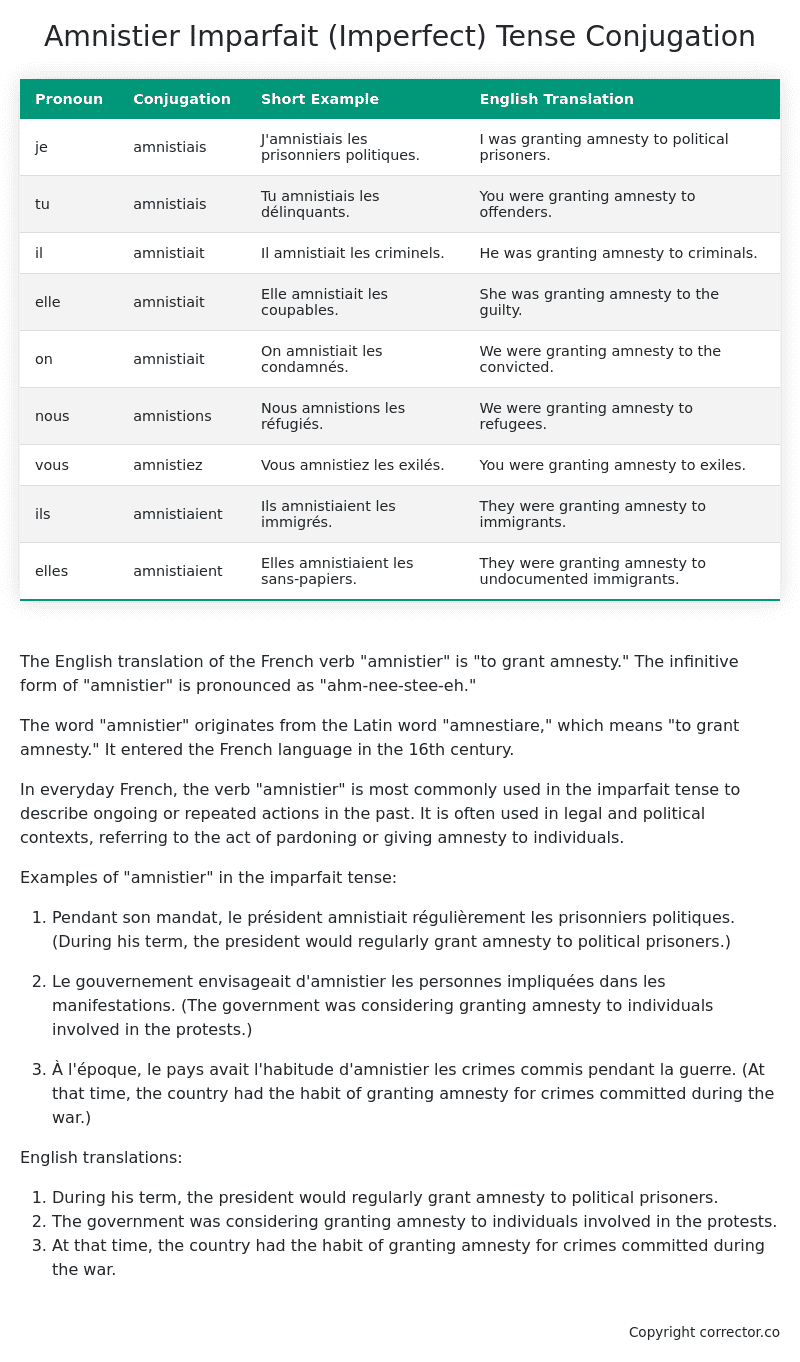Imparfait (Imperfect) Tense Conjugation of the French Verb amnistier
Introduction to the verb amnistier
The English translation of the French verb “amnistier” is “to grant amnesty.” The infinitive form of “amnistier” is pronounced as “ahm-nee-stee-eh.”
The word “amnistier” originates from the Latin word “amnestiare,” which means “to grant amnesty.” It entered the French language in the 16th century.
In everyday French, the verb “amnistier” is most commonly used in the imparfait tense to describe ongoing or repeated actions in the past. It is often used in legal and political contexts, referring to the act of pardoning or giving amnesty to individuals.
Examples of “amnistier” in the imparfait tense:
-
Pendant son mandat, le président amnistiait régulièrement les prisonniers politiques.
(During his term, the president would regularly grant amnesty to political prisoners.) -
Le gouvernement envisageait d’amnistier les personnes impliquées dans les manifestations.
(The government was considering granting amnesty to individuals involved in the protests.) -
À l’époque, le pays avait l’habitude d’amnistier les crimes commis pendant la guerre.
(At that time, the country had the habit of granting amnesty for crimes committed during the war.)
English translations:
- During his term, the president would regularly grant amnesty to political prisoners.
- The government was considering granting amnesty to individuals involved in the protests.
- At that time, the country had the habit of granting amnesty for crimes committed during the war.
Table of the Imparfait (Imperfect) Tense Conjugation of amnistier
| Pronoun | Conjugation | Short Example | English Translation |
|---|---|---|---|
| je | amnistiais | J’amnistiais les prisonniers politiques. | I was granting amnesty to political prisoners. |
| tu | amnistiais | Tu amnistiais les délinquants. | You were granting amnesty to offenders. |
| il | amnistiait | Il amnistiait les criminels. | He was granting amnesty to criminals. |
| elle | amnistiait | Elle amnistiait les coupables. | She was granting amnesty to the guilty. |
| on | amnistiait | On amnistiait les condamnés. | We were granting amnesty to the convicted. |
| nous | amnistions | Nous amnistions les réfugiés. | We were granting amnesty to refugees. |
| vous | amnistiez | Vous amnistiez les exilés. | You were granting amnesty to exiles. |
| ils | amnistiaient | Ils amnistiaient les immigrés. | They were granting amnesty to immigrants. |
| elles | amnistiaient | Elles amnistiaient les sans-papiers. | They were granting amnesty to undocumented immigrants. |
Other Conjugations for Amnistier.
Le Present (Present Tense) Conjugation of the French Verb amnistier
Imparfait (Imperfect) Tense Conjugation of the French Verb amnistier (You’re reading it right now!)
Passé Simple (Simple Past) Tense Conjugation of the French Verb amnistier
Passé Composé (Present Perfect) Tense Conjugation of the French Verb amnistier
Futur Simple (Simple Future) Tense Conjugation of the French Verb amnistier
Futur Proche (Near Future) Tense Conjugation of the French Verb amnistier
Plus-que-parfait (Pluperfect) Tense Conjugation of the French Verb amnistier
Passé Antérieur (Past Anterior) Tense Conjugation of the French Verb amnistier
Futur Antérieur (Future Anterior) Tense Conjugation of the French Verb amnistier
Subjonctif Présent (Subjunctive Present) Tense Conjugation of the French Verb amnistier
Subjonctif Passé (Subjunctive Past) Tense Conjugation of the French Verb amnistier
Subjonctif Imparfait (Subjunctive Imperfect) Tense Conjugation of the French Verb amnistier
Subjonctif Plus-que-parfait (Subjunctive Pluperfect) Tense Conjugation of the French Verb amnistier
Conditionnel Présent (Conditional Present) Tense Conjugation of the French Verb amnistier
Conditionnel Passé (Conditional Past) Tense Conjugation of the French Verb amnistier
Conditionnel Passé II (Conditional Past II) Tense Conjugation of the French Verb amnistier
L’impératif Présent (Imperative Present) Tense Conjugation of the French Verb amnistier
L’impératif Passé (Imperative Past) Tense Conjugation of the French Verb amnistier
L’infinitif Présent (Infinitive Present) Tense Conjugation of the French Verb amnistier
L’infinitif Passé (Infinitive Past) Tense Conjugation of the French Verb amnistier
Le Participe Présent (Present Participle) Tense Conjugation of the French Verb amnistier
Le Participe Passé (Past Participle) Tense Conjugation of the French Verb amnistier
Struggling with French verbs or the language in general? Why not use our free French Grammar Checker – no registration required!
Get a FREE Download Study Sheet of this Conjugation 🔥
Simply right click the image below, click “save image” and get your free reference for the amnistier imparfait tense conjugation!

Amnistier – About the French Imparfait Tense
NOTE: To take a deep dive into all the French tenses then see our article on Mastering French Tense Conjugation.
Formation of the Imparfait Tense
For regular -er verbs:
For regular -ir verbs
For regular -re verbs
Common Everyday Usage Patterns
Description of Past Habits
Background Information
Mental and Emotional States
It’s employed to express emotions, thoughts, or physical sensations in the past. For example: “J’étais content quand il est arrivé.” (I was happy when he arrived.)
Ongoing Actions
Points to Note About the Imparfait Tense
Passé Composé vs. Imparfait
Conditional
Si Clauses
Narration
I hope you enjoyed this article on the verb amnistier. Still in a learning mood? Check out another TOTALLY random French verb imparfait conjugation!


